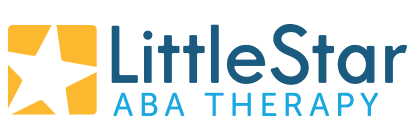Little Star recognized During ABAI Conference Presentation “Addressing Problem Behavior”
Little Star Center (LSC) participated in the 38th annual convention of the Association for Behavior Analysis International (ABAI) in Seattle, Washington from May 25-29.
ABAI is the primary membership organization for those interested in the philosophy, science, application, and teaching of behavior analysis. Its events, research, education, journals, and resources help develop, enhance, and support the growth and vitality of the science of behavior analysis and contribute to success in the field. “This is the largest conference in the U.S. for those interested in behavior analysis,” said Tim Courtney, MS, BCBA, Research & Training Director for Little Star. “Thousands of people take part. Every year, we are exposed to innovative intervention methods, a number of which we bring back and implement at Little Star. It is a terrific learning opportunity.”
The 12 Little Star attendees enjoyed a variety of symposia, workshops, and clinical research poster sessions. Little Star was also recognized for its help in providing data and feedback on assessment techniques for a presentation by Dr. Thomas Zane, BCBA-D, which focused on addressing problem behavior. Dr. Zane is a professor of education and director of the Applied Behavior Analysis Online Program at the Institute for Behavioral Studies, Endicott College in Beverly, MA. Tim said, “Dr. Zane visited Little Star as part of a free community training on fad treatments in autism that Little Star hosted. It was a very good experience for all of us. We were honored to assist Dr. Zane and his important research evaluating assessment techniques to decrease problem behavior.”
Little Star Center also submitted six research posters. The poster sessions provided the opportunity for one-to-one discussions with other conference participants who have experienced similar situations on how they may use our successful procedures for their own implementation. Posters topics comprised:
- Comparing verbal behavior programming via sign language to an iDevice (iPad and iPod) shown in Figure 1;
- Evaluating an intervention to help individuals with autism who experience heightened anxiety when encountering essential procedures such as medical, dental, or even haircuts;
- Determining the feasibility of direct care therapists implementing two different commonly used assessment procedures to address problem behavior; trial-based functional analysis and traditional analogue functional analysis with limited training;
- Evaluating a procedure to reduce a child with autism’s phobic avoidance of hair and hand dryers;
- Assessing perseverative speech in a teenager with autism (repeatedly making the same request) using two types of contingent attention;
- Teaching a learner with autism to respond to group-based instructions.
“The posters are scientific in nature and summarize the process and results,” said Tim. “One of the posters is shown above. Anybody interested in learning more about these posters may contact me at the center, 317.249.2242.”
Conference clinical workshops were intensive, day-long trainings on specific topics. Some personnel toured Morningside Academy, a nonprofit school for elementary and middle school students that integrates several behavior analysis activities and methods including research-based instructional technologies, direct instruction, precision teaching, and talk-aloud problem solving. “I am very impressed with what they are doing with precision teaching,” said Tim.
Other workshops attended by Little Star staff covered subject matter including:
- Teaching Social Skills That Change Lives: Developing Meaningful Relationships for People Diagnosed with Autism;
- Competency-Based Staff Training Within an Applied Verbal Behavior Program;
- Applied Behavior Analysis and Speech Language Pathology: An Integrated Approach to Promoting Language in Learners With Autism;
- Beyond Successive Approximations: Useful Shaping Strategies and Tactics to Improve Your Teaching;
- Addressing Problem and Replacement Behaviors in Home and School Settings;
- Advanced Verbal Behavior Programming for Intermediate Learners;
- Teaching Advanced Language and Verbal Behavior Skills to Students With Autism: Inference Training, Reading Comprehension, and Communication Skills;
- Evidence-Based Practices in Error Correction;
- Intensive Early Intervention: Staff Training and Management Through a Dynamic Programming System;
- Use of Web, Apple, and Android Applications to Increase Information Management and Skill Acquisition in Intensive Community-Based Instruction for Individuals With Autism and Other Disabilities;
- Teaching Executive Functioning Skills to Adolescents With Challenging Behavior; Identifying Priorities for Teaching Children With Autism: Where Do We Begin?;
- Assessing and Teaching Functional Skills to Children With Autism in Home, School, and Community Settings;
- Technology and Learning: Developing Innovative Teaching Methods for Individuals With Autism Spectrum Disorders;
- Fitness and Autism: Evidence-Based Practices to Promote Healthy Lifestyles and Inclusion Opportunities for Individuals With Autism Spectrum Disorders;
- Teaching “Learning to Learn” Skills to Children Diagnosed With an Autism Spectrum Disorder;
- Using the iPad to Aid Students with Autism to Communicate and Be Included in General Education Settings and the Community.
“The conference was exceptional this year,” said Tim. “We are very excited about the possibilities for our learners moving forward. Technology is providing lots of opportunities for assisting individuals with autism in the areas of communication, social skills, leisure and academics. I received a wonderful resource at one of the workshops that lists several iPod, iPad, and iPhone applications. (Click the links below for your area of interest.) Attending the conference is a great way to stay ahead of the rapidly advancing field of behavior analysis.”
Applications by area of interest:
